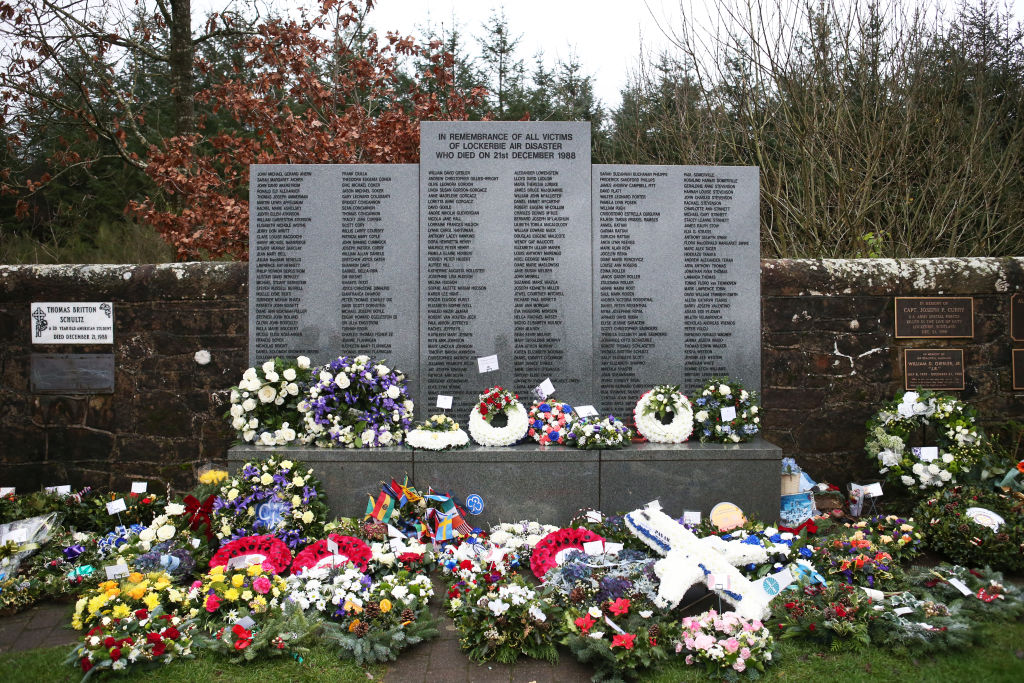Why Lockerbie Bombing Suspect Is in U.S. Custody 34 Years After Attack
A man suspected of building the bomb that killed 270 people on a flight over Lockerbie, Scotland, in 1988 appeared in a U.S. federal court on Monday.
The Department of Justice filed charges against former Libyan intelligence officer Abu Agila Mohammad Mas’ud Kheir Al-Marimi two years ago for his involvement in the Lockerbie bombing. But American law enforcement didn’t take him into custody until this week.
Why did it take more than three decades for Mas’ud to see the inside of a United States courtroom, and why is he being tried in the United States at all? We’ll break it down.
Why Is Lockerbie Bomb Suspect Being Prosecuted in the U.S.?
The bomb on Pan Am Flight 103 killed 190 Americans, including 35 students from Syracuse University. Passengers and crew from 20 other countries also died, along with 11 Lockerbie residents killed on the ground. Until 9/11, the Lockerbie bombing was the deadliest terrorist attack against U.S. civilians.
Terrorist acts targeting U.S. citizens at home and abroad fall under the FBI’s international operations. So the FBI and DOJ joined forces with Scottish prosecutors and police to investigate the bombing.
Authorities have charged Mas’ud under two federal statutes. One criminalizes the destruction of an aircraft and includes aircraft whose final destination is in the United States. Pan Am Flight 103 was headed for John F. Kennedy airport in New York when it exploded.
Mas’ud was also charged with the destruction of a vehicle in interstate or foreign commerce. Both charges carry the possibility of up to 20 years in prison. Because these acts resulted in death, the penalty increases to death or life in prison.
However, prosecutors have said they will not pursue the death penalty because it was not a legal option when the crime took place.
What Took So Long?
Two years after the bombing, U.S. and Scottish prosecutors charged Abdel Baset Ali al-Megrahi and Lamen Khalifa Fhimah for their involvement in Lockerbie. Their criminal proceedings were also drawn out — they didn’t stand trial until 2001.
A special three-judge panel in The Netherlands convicted Megrahi and sentenced him to 27 years in prison. He received a special release after being diagnosed with cancer and died in 2012. Fhimah was acquitted.
Investigators uncovered evidence of another conspirator who went by “Abu Agela Masud,” but could not locate him in the early years of the investigation.
U.S. and Scottish authorities continued working on the case and caught a break after Libyan leader Muammar Qadaffi’s regime fell in 2011. As it turns out, Libyan law enforcement apprehended Mas’ud in 2012 and interviewed him about his possible involvement in the Lockerbie bombing.
The FBI received a copy of Mas’ud’s interview in 2017. In it, he admits to building the bomb that was placed in the cargo hold of Pan Am Flight 103.
When the DOJ charged Mas’ud for his involvement in Lockerbie two years ago, he was already incarcerated in Libya on unrelated charges. After his release last year, he fled to Tripoli and was staying with family when authorities tracked him down in mid-November.
Is There a Statute of Limitations on Acts of Terrorism?
In this case, no. Federal prosecutors may file charges for “capital offenses” at any time, even decades after a crime occurs. As we discussed above, when the destruction of an aircraft results in death, the penalties increase to death or life in prison. They become capital offenses with no statute of limitations.
Mas’ud appeared before a federal judge in Washington, D.C., on December 12. However, he is not expected to enter a plea until later this month after he has hired an attorney.
Related Resources:
You Don’t Have To Solve This on Your Own – Get a Lawyer’s Help
Meeting with a lawyer can help you understand your options and how to best protect your rights. Visit our attorney directory to find a lawyer near you who can help.






